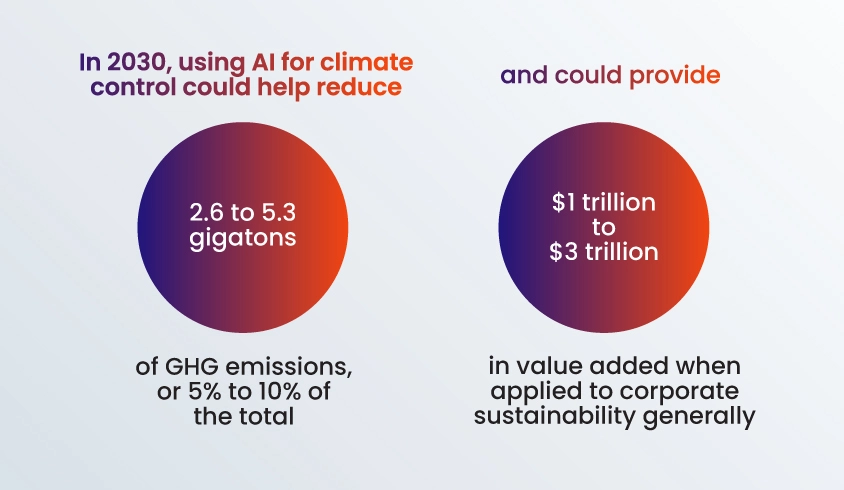- Blog
- February 22, 2024
Data Analytics & AI for Eco Resilience – Building Sustainable Futures

- Blog
- February 22, 2024
Data Analytics & AI for Eco Resilience – Building Sustainable Futures
The tapestry of our planet, once vibrant and resilient, is fraying at the edges. Climate change, biodiversity loss, and resource depletion paint a stark picture of our unsustainable trajectory. The time for action is now, and in this critical struggle, data analytics and artificial intelligence (AI) emerge as powerful allies. These technologies offer not just hope, but tangible tools to understand complex problems, optimize resource use, and chart a course toward a sustainable future
From Data Deluge to Sustainability Solutions:
Imagine a world where:
-
- Renewable energy grids intelligently predict weather patterns and optimize energy production, seamlessly integrating sun and wind power with minimal waste.
- Smart cities become living laboratories, harnessing data to manage resources like water and electricity with precision, reducing emissions, and conserving precious resources.
- Precision agriculture leverages sensor data and AI algorithms to precisely target fertilizer and water usage, boosting yields while minimizing environmental impact.
-

These are not mere dreams, but potential realities unfolding right now. Data analytics and AI are transforming numerous areas crucial for sustainability:-
- Renewable Energy Optimization: Analyzing massive datasets on weather patterns, energy consumption, and grid performance can predict peaks and valleys in demand, optimize energy production and distribution, and ensure seamless integration of renewable sources like solar and wind power. This fosters grid stability and minimizes reliance on fossil fuels.
- Resource Management: Analyzing resource use data from agriculture, manufacturing, and other sectors reveals inefficiencies and opportunities for improvement. AI-powered insights can guide the development of closed-loop systems, minimize waste, and encourage resource conservation across industries.
- Climate Change Mitigation: Analyzing climate data and emissions data equips us with crucial knowledge to understand the impact of human activities and develop effective strategies for mitigating climate change. AI can analyze vast datasets to identify trends, predict future scenarios, and inform policy decisions for a sustainable future.
Image shows hot use of AI can help combat against climate change while improving economic value.

The Edge of Generative AI for Environmental Sustainability
Generative AI emerges as a revolutionary force, pushing the boundaries of innovation. This cutting-edge technology, capable of creating entirely new data and processes, presents exciting possibilities for environmental progress:
1. Nature-Inspired Solutions:
Imagine: Generative AI algorithms mimicking natural processes like photosynthesis to develop more efficient solar energy conversion methods.
Reality: Researchers are using generative models to design novel materials with enhanced light absorption and energy conversion properties, potentially leading to breakthroughs in solar panel technology.
2. Sustainable Material Design:
Imagine: AI generating blueprints for materials with specific desirable properties, minimizing resource consumption and environmental impact.
Reality: Scientists are leveraging AI to design lightweight, durable materials for construction, transportation, and packaging, potentially reducing reliance on resource-intensive conventional materials.
3. Climate Change Modeling and Prediction:
Imagine: AI generating ultra-high-resolution simulations of Earth’s climate system, providing deeper insights into climate change and its potential impacts.
Reality: Generative models are being used to create more accurate and detailed climate simulations, enabling scientists to better predict future scenarios and inform mitigation strategies.
4. Personalized Sustainability Coaching:
Imagine: AI tailoring personalized recommendations for individuals and communities to reduce their environmental footprint.
Reality: Generative AI can personalize sustainability advice based on individual data like energy consumption and travel habits, fostering positive behavioral change.
5. Green Energy Optimization:
Imagine: AI generating optimized designs for renewable energy infrastructure like wind turbines and solar panels, maximizing efficiency and minimizing environmental impact.
Reality: Generative models are being used to design wind turbines with improved aerodynamic efficiency and solar panels with enhanced light capture, optimizing renewable energy production.
Beyond these examples, Generative AI’s potential in sustainability extends to various fields, including:
Developing sustainable agricultural practices: Optimizing crop yields and minimizing water usage.
Creating environmentally friendly products and packaging: Designing products with less material and designing biodegradable packaging solutions.
Accelerating clean energy innovation: Discovering new clean energy sources and optimizing existing technologies.
Data to Action: Your Guide to Sustainability Transformation
Ready to join the movement and become a champion for sustainability? Here’s your roadmap:
-
- Define Your Mission: What sustainability challenges ignite your passion? Do you aim to reduce your company’s carbon footprint, optimize resource use, or promote sustainable practices in your supply chain? Clearly defining your goals sets the direction for your data-driven journey.
- Data is Your Ally: Begin by collecting relevant data points aligned with your goals. This might include energy consumption, waste generation, resource use, customer behavior, or environmental variables. Remember, high-quality data is the foundation for reliable insights.
- Explore Technological Solutions: Explore the realm of data analytics tools and platforms designed to decode and interpret your data efficiently. By integrating machine learning algorithms and advanced data visualization software, you can unlock valuable insights hidden within your datasets, empowering informed decision-making.
- Collaborate with Expertise: Forge alliances with data scientists or sustainability specialists who possess the expertise to navigate the complexities of your data landscape. Their profound understanding and practical insights serve as a crucial link between raw data and actionable solutions, guiding you towards sustainable outcomes.
- Initiate Incrementally, Refine Continuously: Initiate your sustainability journey with a phased approach, starting with manageable projects to pilot your data analytics methodologies. Adopting an iterative cycle allows for gradual progress and iterative refinement, fostering a culture of continuous improvement while minimizing disruption.
- Monitor Progress and Flexibility: Establish robust mechanisms to track the outcomes of your sustainability initiatives, leveraging data-driven insights to inform your decision-making process. Embrace adaptability as a core principle, recognizing that the pursuit of sustainability demands ongoing evaluation and adjustment to align with evolving priorities and challenges.
Beyond the Technology: Human-Centered Sustainability
While data and AI are powerful tools, their true value lies in serving humanity and our planet. It’s crucial to remember that:
-
- Sustainability is not just about technology: It’s about fostering inclusive development, empowering communities, and ensuring a just transition to a sustainable future. Technology acts as an enabler, but human values and ethics must guide its application.
- Data privacy and security are paramount: As we collect and analyze personal and environmental data, ensuring ethical data practices and safeguarding privacy are crucial. Transparency and responsible data governance are essential to build trust and ensure everyone benefits from the data revolution.
- Collaboration is key: No single entity can solve sustainability challenges alone. Collaboration between governments, businesses, NGOs, and communities is essential to develop and implement effective solutions. Sharing data, expertise, and best practices can accelerate progress towards a sustainable future.
The Data-Driven Future of Sustainability
The path to a sustainable future is fraught with obstacles, yet the transformative power of data and AI holds boundless promise. Through ethical and responsible utilization of these tools, we have the opportunity to
-
- Gain deeper understanding: Analyze complex environmental and social systems to identify root causes of challenges and develop targeted solutions.
- Optimize resource use: Make informed decisions about resource allocation, minimize waste, and promote circular economy principles.
- Predict and mitigate risks: Proactively address climate change and other environmental threats based on data-driven insights.
- Empower communities: Share data and knowledge transparently, fostering citizen participation and collaborative solutions for a more just and sustainable future.
-




